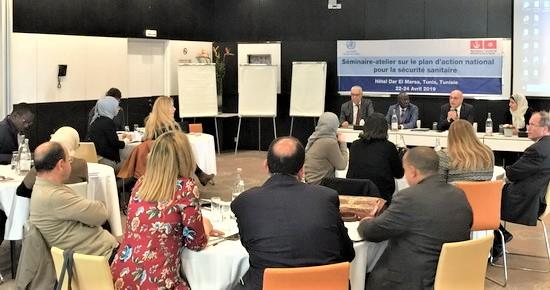
Tunisia finalizes draft national action plan to improve health security
April 22, 2019
Tunisia is moving ahead in creating a national action plan to improve health security, finalizing a first draft of the plan and building on the significant progress made there since completing a joint external evaluation (JEE) exercise in December 2016. During this exercise, Tunisia identified priority areas for action to strengthen its national public health capacities to meet IHR requirements.
The country’s Ministry of Health and all stakeholders are renewing Tunisia’s commitment to achieve full implementation of the International Health Regulations (IHR 2005), said Dr Kaouther Harabech, the Tunisian national IHR focal point and head of the ministry’s Zoonotic Disease Unit.
The draft plan was finalized at a workshop organized by the WHO Regional Office between 22 and 24 April 2019 and attended by representatives of public institutions in Tunisia, UNICEF and the World Organisation for Animal Health.
“Tunisian counterparts have made significant progress since 2016 in implementing the recommendations of the JEE report,” said Dr Yves Souteyrand, WHO Representative in Tunis. One highlight is improving public health security within a multisectoral approach. “Greater efforts are needed to achieve full implementation. WHO will continue working closely with the Government of Tunisia to support these efforts in ensuring Tunisian preparedness for any health emergency.”
During the April 2019 workshop, participants divided into groups based on their areas of expertise. They discussed the 19 technical areas covered by the evaluation exercise to build on current core capacities, and exchanged information to develop the draft action plan and estimate its costs.
“Before the workshop, we held an important meeting with Dr Sonia Ben Cheikh, Her Excellency the Minister of Health, to present the recommendations of the JEE report, update the Minister on progress and elicit support for the way forward. The recommendations of the report provide an excellent opportunity for us to further focus on priority areas identified for improvement,” Dr Harabech said.